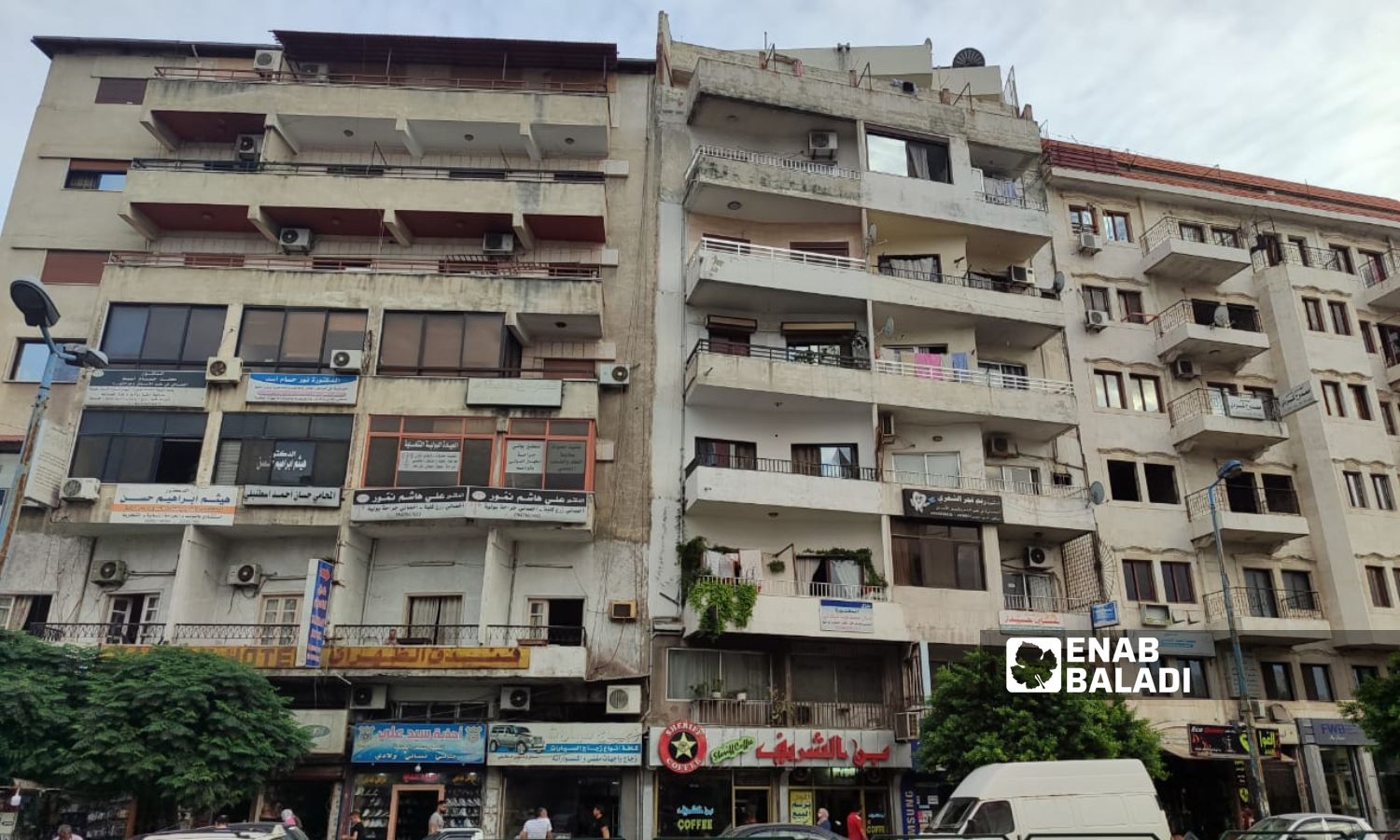



Latakia – Linda Ali
The 45-year-old public sector employee Basil is trying hard to search for a new house to rent for his family in the coastal city of Latakia after the landlord decided to raise the rent from 400,000 pounds ($30) to 700,000 pounds ($50) by the first of October.
Basil, who also works as a taxi driver along with his government job, said that the homeowner’s argument is that salaries had increased by 100% last August, adding that after the increase, his salary became about 212,000 pounds (about $15), which does not cover a third of the required rent.
The US dollar is trading at 13,000 SYP according to the S-P Today website, which covers the trading rate of the Syrian pound to the dollar. At the start of the conflict in 2011, the dollar was trading at 47 pounds.
Basil lives with his wife and two children in the popular neighborhood of Zaqzaqaniya, which gains its importance from being close to the university, and housing is desirable for its students. What worries him most today is his need to find a house in the same neighborhood because it includes his children’s school, and not to disperse them and transfer them to a new school if he finds a home in another neighborhood.
House rents in Latakia are increasing, affected by two factors. The first is the Feb.6 earthquake that struck southern Turkey and four Syrian governorates, and the second is the salary increase in mid-August, without clear controls.
Iman, 22, is from the neighboring city of Tartus and studies at the Faculty of Civil Engineering at Tishreen University in Latakia. She lives in a shared room in the Zaqzaqaniya neighborhood with a colleague at the university.
The owner of the room was taking 150,000 pounds from each of them and raised it to 200,000 pounds after the earthquake. In September, the owner demanded each of them to pay 300,000 pounds, and they tried hard to reduce the amount and succeeded in reducing it to 275,000 pounds “because he encourages women’s education,” as he told them.
The rent for the house in which Salma, 38, lived, which overlooks al-Thawra Street, was 300,000 pounds, and a week after the earthquake, the owner of the house asked for it to be raised to 500,000 pounds.
Salma, who works in a charitable organization in Latakia, stated that after the salaries were raised, the owner of the house requested that the rent be raised to 800,000 pounds for the house consisting of three rooms, a kitchen, and a bathroom, and without furniture.
Before Salma agreed or rejected, she searched for a new home and asked about the costs of moving her household items. She said, “I did not find an acceptable house for less than 700,000 pounds, and then the cost of moving my household items will exceed 3 million pounds.”
She added that if she chose another house, she would pay three months’ worth directly, the first amount for the rent, the second as a commission for the real estate office, and the third for insurance, which forced her to accept the new rent (800,000).
In the al-Ziraa neighborhood in the city of Latakia, which is considered one of the most famous neighborhoods and the most expensive in rents, Lubna, 34, lives with her three children in a furnished rented house.
She was paying one million pounds before the salary increase, and after that, the owner of the house raised the rent to two million pounds, as he realizes that Lubna’s husband is an expatriate in the Emirates, and she would not mind raising the rent, as the woman said.
Lubna told Enab Baladi that she lives in the neighborhood because services in the countryside have declined greatly, and she has no breadwinner after her husband traveled to the UAE, saying, “Greed is a killer, especially when they know that one of the family members is outside Syria.”
Rents in the al-Ziraa neighborhood range between 800,000 pounds and 1.5 million pounds for unfurnished homes and between 1.5 million and 3 million pounds for furnished homes, and the price is governed by the location and area of the house and whether the building is old or new.
Abu Mahmoud, 72, makes a living by renting out the house he owns in the al-Ramel al-Shemali neighborhood, whose rent he raised from 400,000 pounds to 600,000 pounds after the salary increase.
The seventy-year-old retiree said, “Yes, I know it is a large sum for the tenant, but my wife and I want to live as well. What does 600,000 pounds do today?” It is barely enough to buy some food, in addition to our medicines. My salary after retirement does not exceed 160,000 pounds.”
Before 2011, Abu Mahmoud was renting out his house for 8,000 pounds, which was about $166 at the time ($ 1 was trading at 48 pounds).
He added that according to the price at that time, the current rent for his house should be more than 2 million pounds, not 600,000 pounds.
“We are also suffering from the inflation that has swallowed us up. We just want to live the rest of our lives with some dignity without the humiliation of asking for money,” the elderly man continued, praying for relief for the country and its people.
Local economic experts attribute the instability of rental rates to a lack of regulating laws and the absence of state intervention since there is no law that determines house rents in Syria, and the matter is subject to supply and demand only.
Syria’s economy has been struggling after years of conflict, corruption and mismanagement, and Western-led sanctions. The United Nations estimates that about 90% of the population lives in poverty, according to The AP.
if you think the article contain wrong information or you have additional details Send Correction